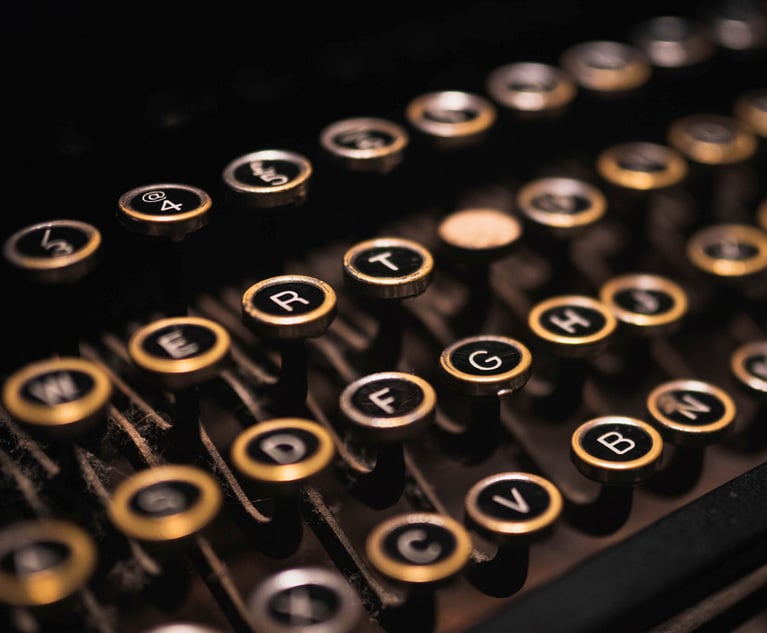 David Boies and Stanley Pottinger. Photos: Boies, courtesy photo, Pottinger, AP.
David Boies and Stanley Pottinger. Photos: Boies, courtesy photo, Pottinger, AP.Boies and Pottinger Open Up About That New York Times Article
In a call that lasted well over an hour, Boies answered questions about the Times piece. Pottinger had his say, too.
December 05, 2019 at 11:59 AM
7 minute read
The questions buzz around him like pesky mosquitos: Why does David Boies keep getting mired in messes that jeopardize his reputation? Is Boies making more mistakes? Or are his mistakes catching up with him?
These issues are on the front burner again because of the recent New York Times article that portrays Boies and his old friend J. Stanley Pottinger as suckers of a con man who goes by the name Patrick Kessler.
 In a call that lasted well-over an hour, Boies answered my questions about the Times piece. Foremost, he takes umbrage at the idea that he was "duped" by Kessler. "My view is that if this guy is real—and he sounded credible—then he's got powerful evidence. I was hopeful, but I was also very careful not to take any action until he produced the photos," Boies says.
In a call that lasted well-over an hour, Boies answered my questions about the Times piece. Foremost, he takes umbrage at the idea that he was "duped" by Kessler. "My view is that if this guy is real—and he sounded credible—then he's got powerful evidence. I was hopeful, but I was also very careful not to take any action until he produced the photos," Boies says.
But first, some background. In a long, rather colorful article, replete with consumption of expensive whiskey and Chinese soup dumplings, the Times tells how Kessler, who purported to be a computer consultant for pedophile Jeffrey Epstein, told the two lawyers that he had videos of prominent men engaged in sex with underage girls at Epstein's estates. (Both Boies and Pottinger represent different sets of women victimized by Epstein.) Among his stash, Kessler claimed, were videos of former Israeli Prime Minister Ehud Barak, Alan Dershowitz and Prince Andrew—plus a few billionaires and the like.
According to the Times, Boies and Pottinger's goal was to use the videos as leverage to pressure the men to settle with the victims, with some of the money going into a charitable foundation. The article says that in a separate chat with Kessler, Pottinger was more explicit about his intentions: "He described hypothetical plans in which the lawyers would pocket up to 40 percent of the settlements and could extract money from wealthy men by flipping from representing victims to representing their alleged abusers."
Needless to say, this is unsavory stuff, ripe for condemnation. Indeed, the Times makes the trope of the sleazy lawyer its central theme, what it calls, "the extraordinary, at times deceitful measures elite lawyers deployed in an effort to get evidence that could be used to win lucrative settlements—and keep misconduct hidden, allowing perpetrators to abuse again."
Very sanctimonious, but I'm not sure where that takes us. First of all, litigation often ends in settlements where the terms are confidential, resulting in keeping alleged misconduct under wraps. So why the shock and outrage?
In any case, my interest isn't the ethics issue (for that discussion, read my colleague Jack Newsham's post). What I'm interested in is how/why the redoubtable Boies keeps getting tripped up, and what that says about his judgment.
In the last two years or so, Boies has found himself in some very notable pickles—namely, his involvement in the Harvey Weinstein #MeToo episode and his apparent attempts to stymie the movie mogul's accusers—as described in vivid detail in two best sellers, She Said and Catch and Kill. Then, there were stories of the ugly tactics he and his firm deployed in thwarting whistleblowers in the Theranos scandal involving Elizabeth Holmes—as explained in another bestseller Bad Blood.
In this latest tangle, according to the Times, Boies got hoodwinked by a fraudster without a portfolio. What's more, it says Boies aligned himself in this venture with Pottinger, who comes off as a cowboy. (Besides describing his plans to make oodles of money from settlements, the piece says Pottinger also texted Kessler that billionaire Sheldon Adelson, a supporter Benjamin Netanyahu, would be willing to pay for compromising photos of Barak, Netanyahu's rival.)
So, why was Boies so willing to place bets on Kessler, who popped out of nowhere? And why would he partner with Pottinger, someone who seems to have piggybacked on Boies' prestige?
Boies describes it this way: "I only had two meetings with [Kessler] because there was nothing to do until he came forward with the evidence. We didn't contact others about him or approach the men he said he had evidence about."
But what clearly irks Boies is the way the Times wrote the story, suggesting that he and Pottinger acted more or less in unison. "They conflated what another lawyer did and said with what I did and said," adding that it would take a "careful reader" to discern "that I had no participation in the text messages going back and forth [between Pottinger and Kessler]."
In fact, Boies Schiller Flexner issued a statement to that effect. One paragraph in the statement reads: "The NYT intentionally and inaccurately conflates the actions of a lawyer who does not practice at or with BSF—and who has different clients with different claims and different economic arrangements than BSF—with the actions of David Boies."
(In response to our request for comment, Jordan Cohen, the Times' communications director, issued this: "We're confident in the accuracy and fairness of our story.")
So, we're back to this question: Was Boies careless in affiliating himself with Pottinger? And why was Boies so out of the loop about what Pottinger was up to? (According to the Times, Boies didn't know about Pottinger's text exchanges with Kessler in September until the Times showed it to him in November. And it was at that meeting with the Times that Boies reported came to the conclusion, "I think [Kessler] was a fraudster who was just trying to set things up.")
Though the firm's statement seems designed to distance itself from Pottinger, Boies doesn't sound so sure, even now. "Pottinger and [his partner] Brad Edwards have been representing Epstein's victims longer than I have. They probably represent more victims than anyone else."
When I described Pottinger as a wild guy, Boies responded: "If you talk to him, he's not quite as wild."
And what about Pottinger? Does he feel responsible that he sullied his friend Boies' reputation with those text messages he sent Kessler?
Pottinger emailed me this response: "David Boies and I worked together on this matter on behalf of our clients. I am not going to characterize the nature and extent of our interactions."
Clearly, Pottinger is indicating that he and Boies were a team. He added: "Because we were pursuing justice for our clients, I do not believe that my actions, or his, have compromised either of our reputations."
And Pottinger, too, claimed that he exercised lawyerly caution: "I myself went to the U.S. Attorney's Office to report Kessler two days after he met with me and lawyers from the Boies Schiller firm at their office."
Moreover, Pottinger said, "I then called the FBI and reported Kessler in the same manner, and also conferred with the Bureau on how to create a safe harbor in the event that Kessler delivered videotapes that might contain or constitute contraband."
Ultimately, both direct their anger at the Times. To support his view that the Times was biased, Pottinger also sent me a much more measured communication he had with Kessler about his concerns that he said the Times chose to disregard. Pottinger said the Times practiced "shoddy journalism."
Of course, it's possible that the Times cherry-picked certain episodes to write a zippier story. But one thing is certain: If you're the brilliant David Boies and it looks like you've been conned by a con—expect to be pounced.
Contact Vivia Chen at [email protected]. On Twitter: @lawcareerist.
This content has been archived. It is available through our partners, LexisNexis® and Bloomberg Law.
To view this content, please continue to their sites.
Not a Lexis Subscriber?
Subscribe Now
Not a Bloomberg Law Subscriber?
Subscribe Now
NOT FOR REPRINT
© 2025 ALM Global, LLC, All Rights Reserved. Request academic re-use from www.copyright.com. All other uses, submit a request to [email protected]. For more information visit Asset & Logo Licensing.
You Might Like
View All

Letter From London: 5 Predictions for Big Law in 2025, Plus 5 More Risky Ones
6 minute readLaw Firms Mentioned
Trending Stories
- 1Florida Supreme Court Publicly Reprimands Miami Founding Partner
- 2Meet the Long Island Judge Tapped to Be US Attorney for Eastern District of New York
- 3This Week in Scott Mollen’s Realty Law Digest: Constructive Trust Claim; Succession Rights; Tenant ‘Blacklisting Law’
- 4Breast Cancer Patient's Negligence Claims Cleared to Proceed Against Recalled BioZorb Marker
- 5Pentagon Settles Suit Seeking to Clear Records of Service Members Discharged for Being LGBTQ
Who Got The Work
Michael G. Bongiorno, Andrew Scott Dulberg and Elizabeth E. Driscoll from Wilmer Cutler Pickering Hale and Dorr have stepped in to represent Symbotic Inc., an A.I.-enabled technology platform that focuses on increasing supply chain efficiency, and other defendants in a pending shareholder derivative lawsuit. The case, filed Oct. 2 in Massachusetts District Court by the Brown Law Firm on behalf of Stephen Austen, accuses certain officers and directors of misleading investors in regard to Symbotic's potential for margin growth by failing to disclose that the company was not equipped to timely deploy its systems or manage expenses through project delays. The case, assigned to U.S. District Judge Nathaniel M. Gorton, is 1:24-cv-12522, Austen v. Cohen et al.
Who Got The Work
Edmund Polubinski and Marie Killmond of Davis Polk & Wardwell have entered appearances for data platform software development company MongoDB and other defendants in a pending shareholder derivative lawsuit. The action, filed Oct. 7 in New York Southern District Court by the Brown Law Firm, accuses the company's directors and/or officers of falsely expressing confidence in the company’s restructuring of its sales incentive plan and downplaying the severity of decreases in its upfront commitments. The case is 1:24-cv-07594, Roy v. Ittycheria et al.
Who Got The Work
Amy O. Bruchs and Kurt F. Ellison of Michael Best & Friedrich have entered appearances for Epic Systems Corp. in a pending employment discrimination lawsuit. The suit was filed Sept. 7 in Wisconsin Western District Court by Levine Eisberner LLC and Siri & Glimstad on behalf of a project manager who claims that he was wrongfully terminated after applying for a religious exemption to the defendant's COVID-19 vaccine mandate. The case, assigned to U.S. Magistrate Judge Anita Marie Boor, is 3:24-cv-00630, Secker, Nathan v. Epic Systems Corporation.
Who Got The Work
David X. Sullivan, Thomas J. Finn and Gregory A. Hall from McCarter & English have entered appearances for Sunrun Installation Services in a pending civil rights lawsuit. The complaint was filed Sept. 4 in Connecticut District Court by attorney Robert M. Berke on behalf of former employee George Edward Steins, who was arrested and charged with employing an unregistered home improvement salesperson. The complaint alleges that had Sunrun informed the Connecticut Department of Consumer Protection that the plaintiff's employment had ended in 2017 and that he no longer held Sunrun's home improvement contractor license, he would not have been hit with charges, which were dismissed in May 2024. The case, assigned to U.S. District Judge Jeffrey A. Meyer, is 3:24-cv-01423, Steins v. Sunrun, Inc. et al.
Who Got The Work
Greenberg Traurig shareholder Joshua L. Raskin has entered an appearance for boohoo.com UK Ltd. in a pending patent infringement lawsuit. The suit, filed Sept. 3 in Texas Eastern District Court by Rozier Hardt McDonough on behalf of Alto Dynamics, asserts five patents related to an online shopping platform. The case, assigned to U.S. District Judge Rodney Gilstrap, is 2:24-cv-00719, Alto Dynamics, LLC v. boohoo.com UK Limited.
Featured Firms
Law Offices of Gary Martin Hays & Associates, P.C.
(470) 294-1674
Law Offices of Mark E. Salomone
(857) 444-6468
Smith & Hassler
(713) 739-1250










